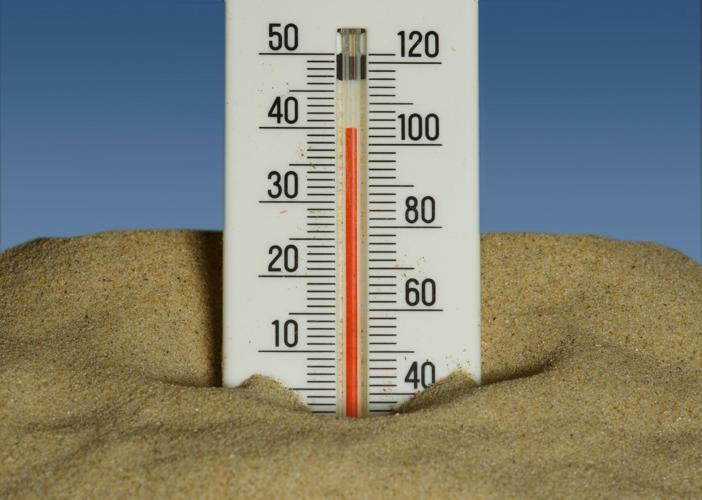
Immo Wegmann
By Stephen Beech
More than 4,400 people died in the UK due to record-breaking hot weather over the three previous summers, according to new research.
Almost two-thirds of those deaths (2,783) occurred in the summer of 2022 when the UK sweltered amid a record heatwave, say scientists.
A total of 62,775 deaths across Europe - including 573 in the UK - were attributed to hot weather during the summer of 2024.
In all, more than 181,400 deaths across the continent - including 4,435 in the UK - were related to heat during the summers of 2022, 2023, and 2024, according to the study.
The estimated summer heat mortality rate was 323% higher among people over 75 than in all other age groups, say scientists.
The year 2024 broke several European-wide temperature records - including the hottest year ever recorded, and the warmest summer.
The new study, led by the Barcelona Institute for Global Health (ISGlobal) in Spain, estimated that 62,775 heat-related deaths occurred in Europe between June 1 and September 30 last year.

(Photo by Pixabay via Pexels)
The figure is 23.6% higher than the 50,798 estimated for the summer of 2023, but 8.1% lower than the 67,873 estimated for summer 2022.
The findings, published in the journal Nature Medicine, suggest 573 deaths in the UK in summer 2024 were down to the heat, the 15th highest death toll of the 32 countries studied.
The figure is well down on the 2,783 UK heat-related deaths in summer 2022, which saw the hottest temperature ever recorded in the UK of 104.5°F (40.3°C) at Coningsby in Lincolnshire on July 19 that year.
It was the first time the UK experienced a reading above 40 °C and occurred during a summer heatwave that broke records across England, Scotland, and Wales.
A total of 37 deaths in Ireland in summer 2024 were attributable to heat, according to the study, with only Luxembourg, Norway and Sweden recording lower numbers of the 32 nations involved in the study.
The country with the highest number of heat-related deaths was Italy, with more than 19,000 estimated fatalities in the summer of 2024.

Hans Reniers
Italy was also the country with the highest number of heat-related deaths in the two previous summers, according to the study.
Spain had the second highest number of heat-related deaths in the summer of 2024 with more than 6,700, followed by Germany, Greece and Romania.
In the case of Spain, estimated deaths in 2024 were almost half those for 2022, due to lower summer temperatures than in the previous two years.
The countries with the highest heat-related death rates for the same period were Greece (574 estimated deaths per million people), Bulgaria (530 deaths per million) and Serbia (379 deaths per million).
The research team said those rates were "significantly higher" than those estimated for the two previous summers of the study, the highest of which was 373 deaths per million in Greece during 2023.
Overall, 15 of the 32 assessed countries experienced their highest heat-related mortality burden and rates during the summer of 2024.

Luis Graterol
The number of heat-related deaths was higher among women and older people during the three summers, according to the study.
It is estimated that in the summer of 2024, the number of heat-related deaths among women was 46.7% higher than among men.
Study first author Dr. Tomáš Janoš, of ISGlobal, said: "Although the summer of 2024 was the hottest on record according to Copernicus, in the specific regions of our study, the summers of 2022 and 2023 were actually hotter.
"However, these regional differences in average temperature are not fully reflected in mortality, as the estimated deaths for 2024 were higher than those estimated for the summer of 2023 and only slightly lower than those for 2022.
"This is because in 2022 and 2024, the highest temperatures occurred in south-western and south-eastern Europe, respectively, both areas that are highly vulnerable to heat."
He added: “Europe is the continent that is warming most quickly, at twice the global average.
"And within Europe, the Mediterranean basin and south-eastern regions are emerging as major climate change hotspots, facing the greatest impacts on health and with a substantial rise in heat-related mortality projected during the 21st Century."

(Photo by Alexey Demidov via Pexels)
In total, the study suggests that there were more than 181,000 heat-related deaths in Europe during the three summers studied, two-thirds of which occurred in southern Europe.
Study senior author Professor Joan Ballester Claramunt says the magnitude of the figures highlights the need to “strengthen adaptation strategies, including the development and implementation of a new generation of continent-wide, impact-based heat-health early warning systems."
Part of the study was devoted to evaluating Forecaster.health - a tool which uses epidemiological models to transform weather forecasts into daily operational heat-health alerts by region and for specific population groups.
The analysis shows that the tool is "highly reliable" in issuing heat-health alerts at least one week in advance when conditions point to an "exceptional" mortality risk.
Claramunt added: “In southern Europe, however, the early warning system continued to show relatively high reliability even beyond this seven-day horizon, which, considering that this is the area with the highest heat-related mortality on the continent, represents an unexplored opportunity to save lives among the most vulnerable populations."

























(0) comments
Welcome to the discussion.
Log In
Keep it Clean. Please avoid obscene, vulgar, lewd, racist or sexually-oriented language.
PLEASE TURN OFF YOUR CAPS LOCK.
Don't Threaten. Threats of harming another person will not be tolerated.
Be Truthful. Don't knowingly lie about anyone or anything.
Be Nice. No racism, sexism or any sort of -ism that is degrading to another person.
Be Proactive. Use the 'Report' link on each comment to let us know of abusive posts.
Share with Us. We'd love to hear eyewitness accounts, the history behind an article.